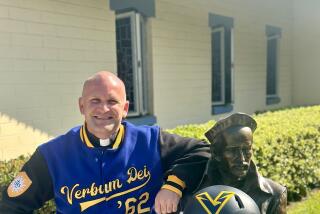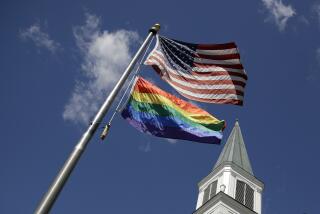Scandal-Rocked SMU Strengthening Ties With Church
- Share via
DALLAS — In the wake of the football scandal that rocked Southern Methodist University in recent years, the school is slowly strengthening its ties once again with the United Methodist Church.
SMU President A. Kenneth Pye said redefining and re-establishing the school’s relationship with United Methodists is one of the four most pressing problems at the school today. The other three are planning, improving the school’s financial situation and increasing enrollment.
The initiatives are part of a wide attempt to rebuild the school’s image after the athletic scandal that restricted the school’s football program for several years.
Fulfilling a Prediction
The new moves by the school also seem to fulfill the prediction of a church official in the days immediately following the February, 1987, ruling by the National Collegiate Athletic Assn. that barred the university from football competition in 1987 and banned appearances on television or in bowl games until the 1989 season. The NCAA action also resulted in the resignations of the school’s top leadership and an overhaul of its corporate structure.
The late United Methodist Bishop Walter L. Underwood of Baton Rouge, La., then a member of SMU’s Board of Trustees, said at the time of the NCAA ruling, “It’s a blessing in disguise. The university is going to re-establish a tie to the church--a tie that has been visibly eroding over the past 20 years.”
Pye, the president selected to lead the university back to good standing, recently set up a task force to examine the school’s relationship with the United Methodist Church. It is one of three task forces he has created since assuming the SMU presidency nine months ago. The other two task forces focus on the school’s finances and academic priorities.
Status Restored
In a related development, the church’s University Senate recently restored SMU as a church-related institution “without qualification.” The senate is responsible for reviewing church-related schools and gave SMU a public warning in June, 1987, after revelations of the school’s play-for-pay football scandal. Senate President Roy B. Shilling Jr. said the change was in recognition of outstanding progress the troubled Texas school has made under Pye’s leadership.
In establishing the task force on church relatedness, Pye said: “Since its founding in 1911, SMU, through its Perkins School of Theology and through many other educational endeavors, has contributed much to United Methodism and to its South Central Jurisdiction. Despite these contributions, however, it must be admitted that the university’s sense of church relatedness has not always been one of clarity and consistency. With the reforms of 1987, and with new leadership within the institution, we have an important opportunity to re-examine and explore new dimensions of SMU’s church relatedness.”
The Rev. Jim Caswell, a United Methodist minister who is SMU’s vice president for student affairs and the school’s newly appointed liaison with the church, said the task force is the most obvious of several initiatives aimed at upgrading the school’s relations with United Methodists.
Among those are his appointment as church liaison, a new emphasis on recruiting graduates of United Methodist junior colleges and young people affiliated with United Methodist churches, and Pye’s recent “open and candid” presentation to the quadrennial meeting in New Orleans of the South Central Jurisdictional Conference of the United Methodist Church.
He said that in the past, the school did much less to cultivate its relations with the church and said it now is seeking ways, both large and small, to make improvements.
“This is different than before, because (then) there was not a person (here) interested in or actively cultivating the school’s relationship with United Methodists,” he said.


